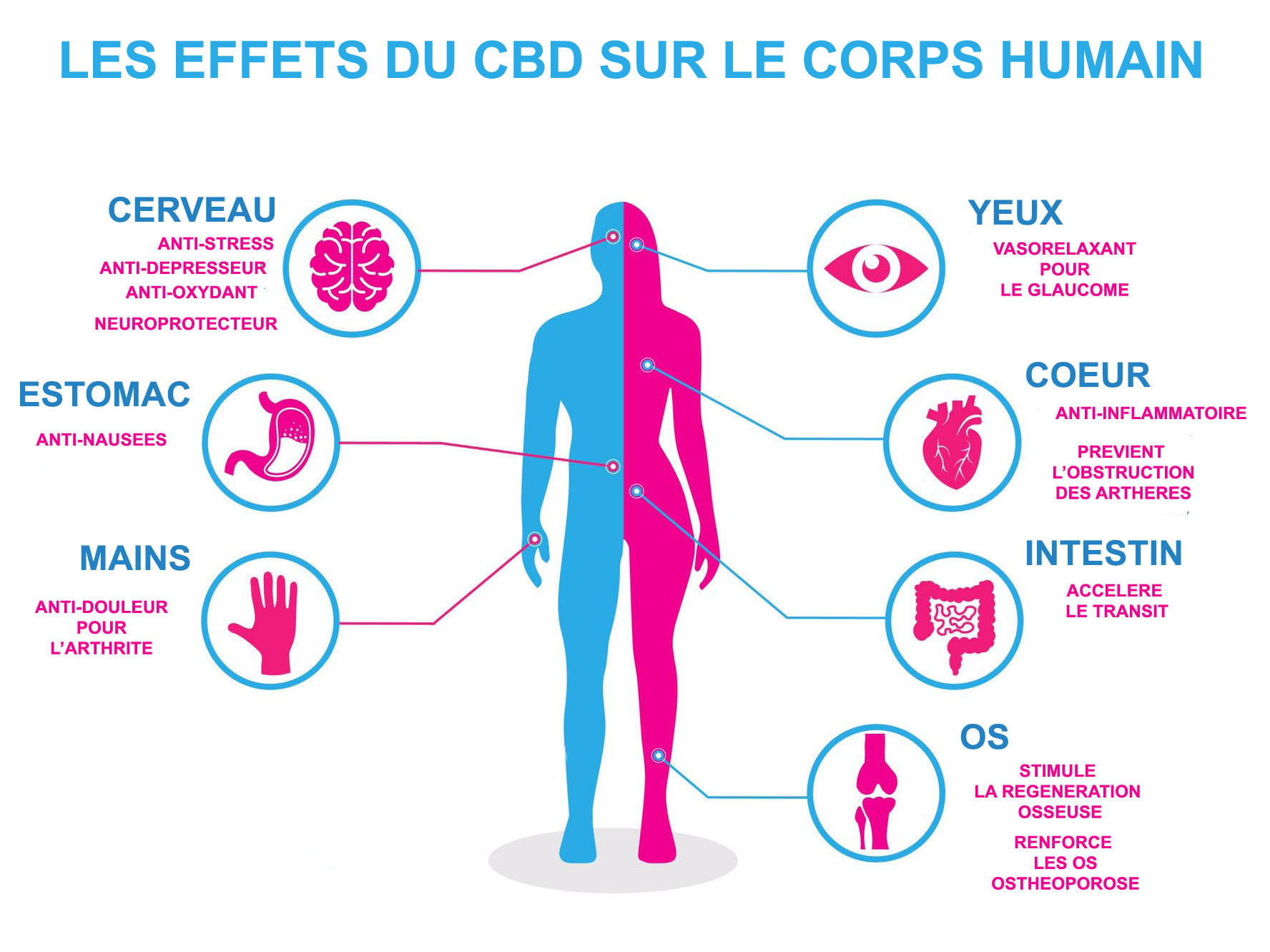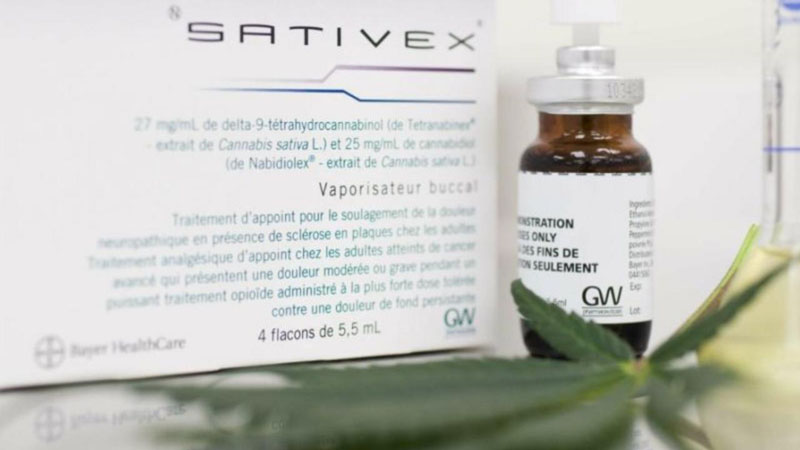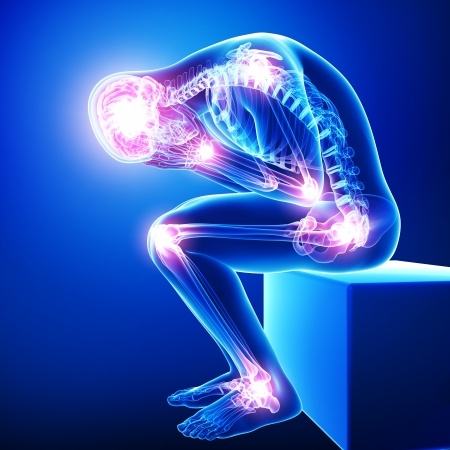Have a question? 06 70 73 89 02
🔞 Not for sale to under 18s
🔥 -20% with code JULY🔥 (except accessories and gummies)
Have a question? 06 70 73 89 02

In the form of oil, capsules, flowers, resins, herbal teas... CBD (cannabidiol) is attracting growing interest due to its many health benefits. It is invading both physical sales outlets and the Internet.
It's not just a fad: CBD has many advantages and can be the source of many benefits. In this article, we look at 8 scientifically-proven benefits of CBD!
CBD is short for cannabidiol, one of the many cannabinoids found in Cannabis, which is made up of two subspecies: Hemp and Marijuana.
In terms of concentration, CBD is the second most important cannabinoid in cannabis, just after THC (tetrahydrocannabinol). Unlike THC, CBD does not produce psychotropic effects such as euphoria.
However, depending on the amount taken, the effects of CBD differ: at a low dosage, CBD can make you feel energized and alert. On the other hand, at higher doses, CBD can also help to relax the body and mind.
Finally, a report by the World Health Organization's Expert Committee[1] confirms that CBD is non-addictive. Although it may have certain side effects, these do not represent a health risk. Nevertheless, it is generally recommended not to exceed the maximum dose of 1,500 mg per day.
For pregnant women, studies do not confirm the absence of risk associated with CBD intake.
Cannabis was used to treat pain in China as far back as 10,000 BC.
More recently, scientists have discovered that certain components of cannabis, including CBD, have analgesic effects.
Studies[2] have shown that CBD can help reduce chronic pain by acting on endocannabinoid receptor activity.
In this study[2], 15 of the 18 clinical trials showed significant results in terms of pain relief.
After two weeks of treatment, patients reported an average 30% reduction in pain intensity.
In addition, a drug called Sativex, which is a combination of THC and CBD, has been approved in many countries to treat the pain associated with multiple sclerosis.
CBD is also used as a complementary natural remedy to relieve sports injuries and pain associated with arthritis, back pain, menopause etc...

CBD may also have an effect on mood. The therapeutic properties of this molecule in this respect have as yet been little studied.
According to a recent (2018) clinical study, albeit conducted on mice: CBD shows great promise in treating both depression and anxiety.[3]
In another Brazilian study, this time carried out on people: 57 subjects were given either oral CBD or a placebo 90 minutes before facing a simulated public speaking test. The researchers found that a 300 mg dose of CBD was effective in significantly reducing anxiety during this test.[4]
If you suffer from sleep disorders or insomnia, taking CBD before bedtime may help.
According to a 2019 study by the University of Pittsburgh[5], thanks to its anti-anxiolytic effect, CBD proved effective for 66% of the 72 people in this clinical study. CBD helps you fall asleep faster, and improves sleep quality.

CBD can also help reduce chemotherapy-induced nausea and vomiting[6].
One study examined the effects of CBD and THC in 177 people suffering from cancer-related pain that was not relieved by conventional painkillers. Those treated with an extract containing both compounds showed a significant reduction in pain compared to those given THC extract alone[7].
One study found that with the drug Sativex, which combines THC and CBD, spasms were reduced in 75% of people with multiple sclerosis who had drug-resistant muscle spasticity[8].
CBD has an anticonvulsant effect: A study conducted with 214 people suffering from severe epilepsy with doses between 0.9 and 2.3 grams of CBD oil per pound (2-5 g / kg) of body weight. Their epileptic seizures were reduced by an average of 36.5%[9].
Several animal studies have shown that CBD can help reduce inflammation and cell death (necrosis) associated with heart disease, due to its powerful antioxidant and anti-stress properties.
For example, one study found that CBD treatment reduced oxidative stress and prevented heart damage in diabetic mice with heart disease[10].
According to recent scientific studies, CBD oil may help treat acne due to its anti-inflammatory properties and ability to reduce sebum production[11].
CBD is said to have beneficial effects on other skin diseases such as psoriasis and eczema.

In a clinical study published in 1998[12], cannabidiol was found to contain certain antioxidant properties more powerful than vitamins C and E, two powerful antioxidants.
Neurodegenerative diseases such as Alzheimer's and Parkinson's are combated with CBD and other antioxidant-rich diets.
Another 2018 study that compiled research from animal and human studies confirms the neuroprotective, anti-inflammatory and immunomodulatory* effects of CBD and THC for several neurological diseases, including Alzheimer's.
*modification of the body's immune response without increasing the risk of infection or tumors.